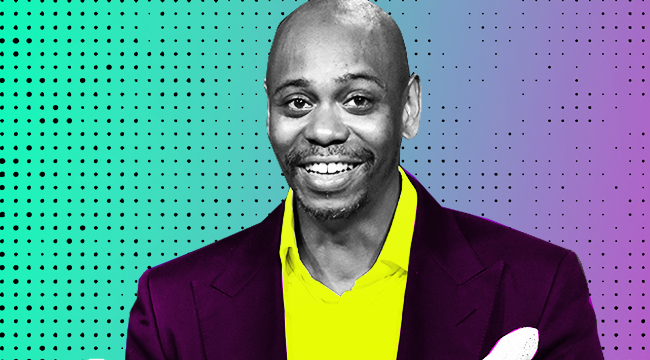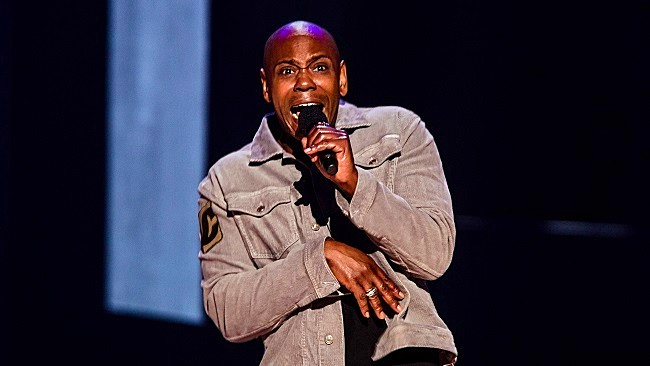
About halfway through The Bird Revelation, the second of two specials that Dave Chappelle dropped on New Year’s Eve, he pauses a particularly well-turned joke for a moment of gravitas:
Everybody gets mad because I say these jokes… but you gotta understand that this is the best time to say ’em. Now more than ever. I know that there’s some comedians in the back — motherfuckers you have a responsibility to speak recklessly. Otherwise my kids may never know what reckless talk sounds like… the joys of being wrong.
I didn’t come here to be right.
Like it or not, that snippet of philosophical waxing embodies the four specials Chappelle released via Netflix in 2017, and, to a certain degree, the way he’s approached his entire career. Across three decades, the comic has been a habitual reckless speaker, albeit one for whom even the most seemingly careless statements are made with laser-edged precision. Nine times out of ten, he’s Steph Curry on the mic — fast and loose and improvisational, but also dialed in down to the micrometer.
It’s a crazy balancing act, to flirt so closely with losing control, and for years Chappelle has nailed it. But reactions to the comic’s New Year’s Eve specials — and. there. have. been. soooooo. many. — suggest that perhaps his reckless speech has grown miscalibrated.
* * *
The last sentence of The Bird Revelation’s “reckless talk” interlude is worth unpacking. Maybe Chappelle didn’t “come here to be right”, but he damn sure seems to think he is. Have you seen the special? No comic goes into lecture mode so often without being interested in “rightness.” In fact, it’s his capacity for being right that made the man so vital in the first place.
In the ’90s, his edginess when discussing race became crucial to our collective progress — his was a bold new voice for people who felt pushed to the margins. From his first TV appearances, his assessment of white-black relations was loaded with painful truths.
In 2003, Chapelle got mega-famous for his propensity toward rightness. He made a career of taking stereotypes and stealing power from them by confronting them head-on, murdering them with blunt force trauma in sketches like “Frontline — Clayton Bigsby.” Then he quit (for reasons that were once mysterious and are now just murky). Hung around South Africa. Threw some cool block parties. Bought a place in Ohio.
The world moved on, as it always does. Times and sensibilities shifted.
While staging a mainstream comeback in 2017, Chappelle has discovered that, whether he came here to be right or not, he sure does get disagreed with a lot more these days. Suddenly, people find his talk a little too reckless. They cringe at certain punchlines and he snaps back at them for cringing. (In The Bird Revelation he directs multiple clarifications of intent at a woman he catches wincing during his #MeToo material.) Across all four specials, he bristles against recent instances of being called on the carpet by critics, then either reminds us that he’s bulletproof thanks to his bank balance or attempts to placate anyone taking offense with an “I’m on your side, buuuuutttttt…”
Clearly, in Chappelle’s mind, his fans have changed since the good old days. We’ve gone all snowflakey on him and forgotten how to take a joke. We’ve got “brittle spirits” now and “brittle ears” too.
Maybe there’s some truth to this. If it launched in 2018, The Chappelle Show would be in danger of getting thinkpieced out of existence. The few bits that stumbled would be amplified and that noise might make it harder for us to appreciate the many sketches that worked brilliantly. “New York Boobs” would get shredded and the R. Kelly clips (and similarly-themed stand-up bits) would be called out for making light of sexual assault.
The counterpoint to the “brittle” argument is that we have indeed changed, but it’s Chappelle who’s gone stiff. He’s set in his ways now and his wokeness has stayed stuck in 2003 — while the left-leaning segment of society that first fell in love with him has broadened the range of inequalities to which they pay attention, encompassing many of the people that the comic insists on poking fun of. Suddenly, his punchlines are seen as shots fired and even his attempts to mellow them out with reminders that they’re “just jokes” don’t land.
For what it’s worth, Dave-as-the-brittle-one is a pretty easy argument to make: He’s a 44-year-old straight dude who lives in Ohio. He stays off Twitter (a flawed platform that’s nevertheless created a home for underrepresented voices) and he’s not involved in internet culture (where many conversations about race, gender, sexuality, and the intersectionality of these issues are conducted). He’s also been insulated by extreme wealth for a long time now. How tuned in to issues outside of his direct experience did we really expect the man to be?
Politically speaking, by today’s standards Chappelle is relatively moderate. The spectrum has moved beneath him over time. Considering that, he’s pretty damn accepting — repeating in Equanimity that he’s pro transgender, pro women, pro everything as long as he can crack wise a little. If every 44-year-old rich, straight dude in the Midwest shared the comedian’s professed willingness to embrace what he doesn’t fully understand we’d have an altogether different country.
Can we really fairly assume that other 44-year-old rich, cis, straight men in Ohio want to be “imperfect allies” to #MeToo? That they would stand up to say “I want you to win this fight”? Doubtful.

Perhaps the best thing about 2017’s specials — like so much of Chappelle’s career — is the creation of thoughtful conversation. Even in The Bird Revelation, an incredibly loose set that clearly would have benefitted from more polish, the jokes are too sharp to be dulled by lazy commentary. If we’re going to sit around and argue about the specials at pizza shops and coffee houses or online, we’ll have to be on our respective games.
The word “problematic” — the ultimate crutch for people who know they’re offended by something but can’t pinpoint what with any real specificity — is way too nebulous to foist on Dave Chappelle. You want to call out his reckless speech? Quote him. Bring examples. Cite your sources. Was it the fact that he punched down when discussing #MeToo? The “yeeeech” bit about Caitlyn Jenner? The “if Harvey Weinstein looked like Brad Pitt” line?
The man is far too much of an artist for imprecise attacks on his work — any slicing of his stand up has to be done with a scalpel. That same scalpel helps us cut to the heart of the bigger issues.
This on its own is a victory. By engaging with Chappelle’s comedy in such a deep way, we have to enter into a thoughtful critique of the actual topics themselves. In this sense, stand up becomes a gateway drug for gaining a deeper understanding of the big picture ideas that he tackles.
The “reckless talk” quote at the beginning of this piece is slightly truncated. It actually ends, “I didn’t come here to be right; I just came to fuck around.” This last clause is hard to buy into. Chappelle goes solemn more than any comic in the game. In Equanimity he tells the somber story of Emmett Till’s murder; in The Bird Revelation he closes on Iceberg Slim’s exploitation of a prostitute. These are two extremely “not just fucking around”-type tales. Back in the early early days he’d just fuck around, but by the time Chappelle’s Show launched he was ready to take himself seriously.
A more digestible conclusion to the quote might be “I didn’t come here to be right; I just came to talk about shit.” After all, talking about shit seems to be Chappelle’s version of fucking around in the recreational sense — the fact that he can do that so naturally in front of an audience is a magnificent gift. In talking, the comic has gotten us to talk. To wrestle over his jokes, our bristling at his jokes, his defensiveness at our bristling at his jokes, and our deeper responses to his defensiveness at our bristling at his jokes.
That layered conversation inherently brings about a more nuanced understanding in all of us regarding the matters at hand. It’s much needed. Especially in 2018.
These are complicated times. Anyone who wants to try to talk with any sort of depth about the #MeToo movement, race, gender, or politics will have to be brave enough to risk experiencing “the joys of being wrong.” Chappelle’s specials, imperfect as they are, get us talking. They get us all tangled with tough topics. It’s something he’s done with varying degrees of success since starting out in the ’90s. Maybe his “conversation stirring” act peaked in the early 2000s, but it’s still pretty solid.
As the man who sparked a million thoughtful conversations, Chappelle manages to have blind spots and still be right on… even if he didn’t come for that.






